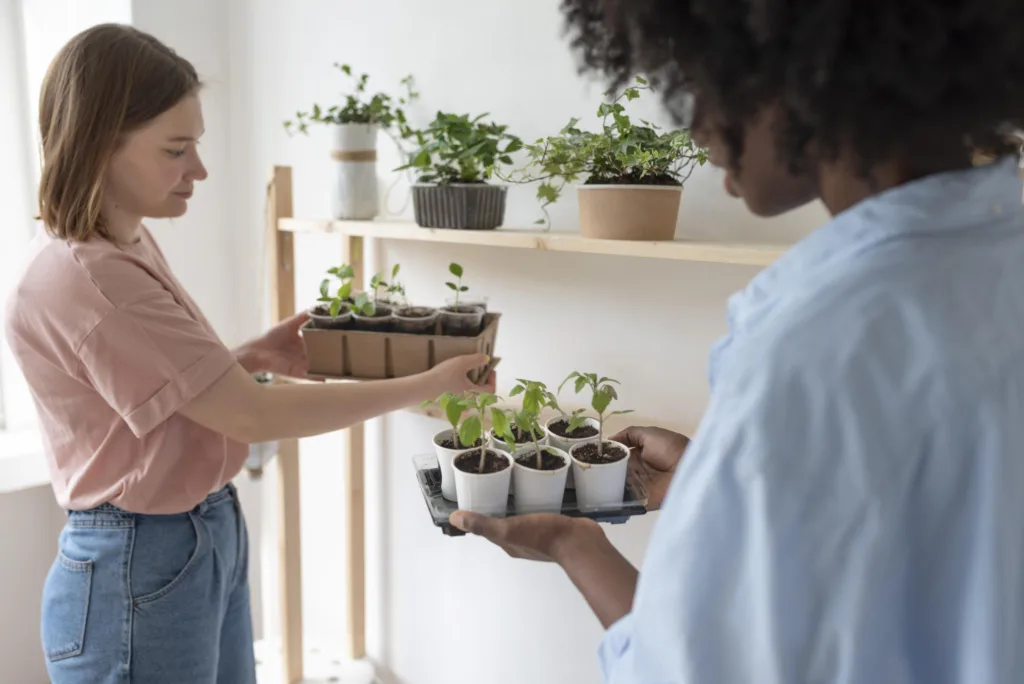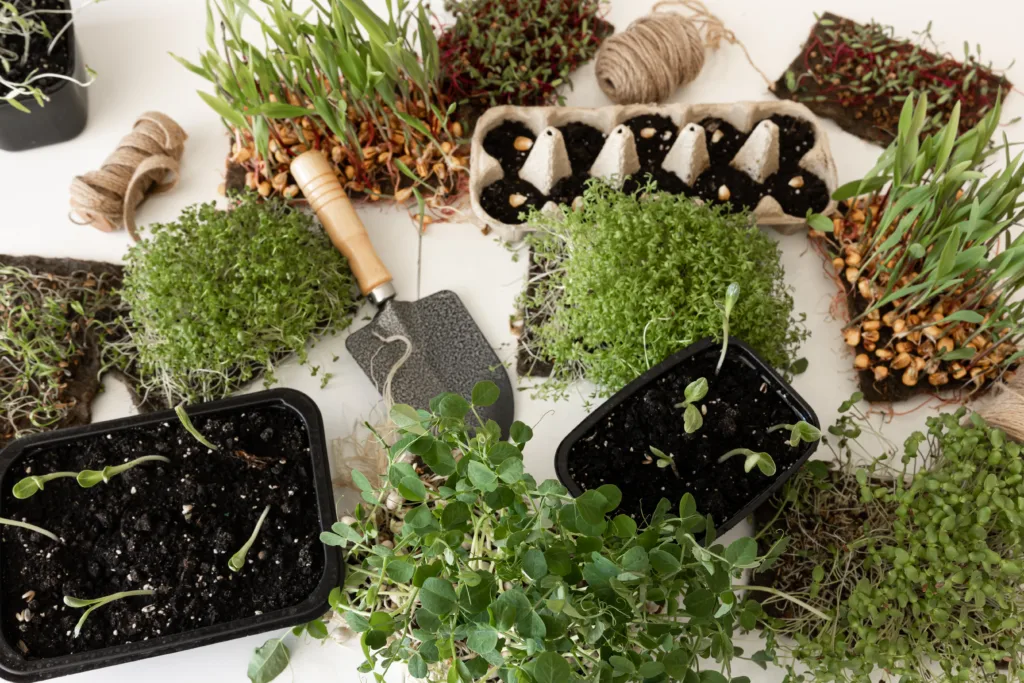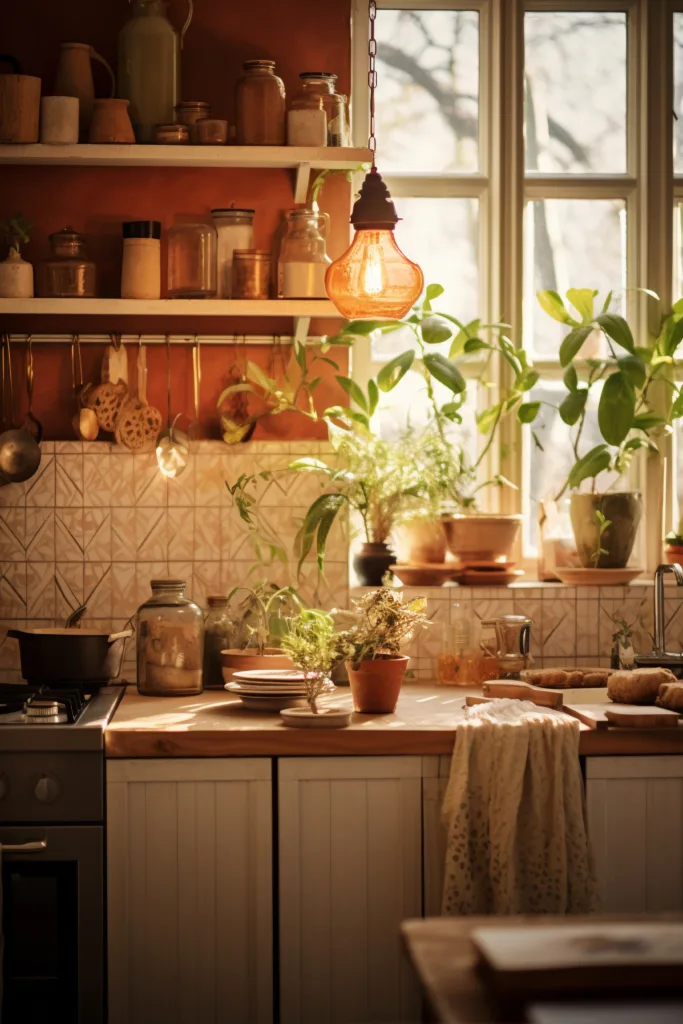
Table of Contents
Introduction
In the hustle and bustle of modern life, the concept of bringing nature indoors has gained significant traction, particularly in the realm of cooking. Indoor organic gardens have emerged as a popular trend, offering a sustainable and convenient way to incorporate fresh, home-grown produce into the modern organic kitchen. Let’s explore the enchanting world of indoor organic gardens, unraveling their benefits and understanding how they seamlessly integrate into the ethos of a contemporary, health-conscious culinary space.
Bringing Nature Closer: The Essence of Indoor Organic Gardens
1. Sustainable Gardening Year-Round:
Indoor organic gardens break free from the constraints of seasonal changes. With controlled environments, you can cultivate herbs, vegetables, and even some fruits throughout the year, ensuring a constant supply of fresh ingredients for your kitchen endeavors.
2. Space-Efficient Greenery:
Modern living spaces often lack expansive outdoor gardens. Indoor organic gardens address this constraint by offering a space-efficient alternative. Whether you have a spacious kitchen or a compact apartment, vertical gardens, hanging planters, and countertop herb kits bring a touch of greenery to any setting.
3. Organic, Pesticide-Free Delights:
The allure of organic produce lies in its purity. Indoor gardens allow you to cultivate herbs and vegetables free from harmful pesticides and chemicals. Embracing organic gardening principles contributes to healthier, chemical-free meals.
4. Culinary Creativity at Your Fingertips:
Imagine plucking fresh basil, mint, or cherry tomatoes directly from your indoor garden while preparing a meal. Indoor organic gardens encourage culinary experimentation by providing immediate access to a diverse array of herbs and small vegetables, elevating the flavors of your dishes.

The Benefits of Indoor Organic Gardens.
1. Health-Conscious Living:
Incorporating home-grown, organic produce into your meals supports a health-conscious lifestyle. Knowing the origin of your ingredients and cultivating them in a controlled environment promotes confidence in the quality of your food.
2. Sustainability in Every Bite:
Indoor organic gardens align with the ethos of sustainability. By growing your own herbs and vegetables, you reduce your carbon footprint associated with transportation and packaging. It’s a small yet impactful step toward a more eco-friendly kitchen.
3. Aesthetically Pleasing Green Spaces:
Beyond their functional benefits, indoor organic gardens add a touch of beauty to your kitchen. Lush greenery, vibrant colors, and the natural fragrance of herbs create a visually appealing and inviting culinary space.
4. Therapeutic Gardening:
Engaging in indoor gardening is not just about the end result—it’s a therapeutic journey. Tending to your plants, watching them grow, and interacting with nature indoors can have positive effects on mental well-being, adding a sense of tranquility to your kitchen oasis.
5. Educational Opportunities:
Indoor organic gardens provide valuable educational experiences, especially for families. Involving children in the process of planting, nurturing, and harvesting fosters a connection to food sources and imparts a greater understanding of sustainable living practices.

Creating Your Indoor Organic Haven
1. Choose Your Plants Wisely:
Select herbs and vegetables that thrive in indoor conditions. Popular choices include basil, mint, thyme, rosemary, and compact varieties of tomatoes and peppers.
2. Invest in Quality Soil and Containers:
Use nutrient-rich organic soil and choose containers with adequate drainage. This ensures optimal growing conditions for your indoor garden.
3. Provide Adequate Light:
Place your indoor garden near windows with ample sunlight or invest in grow lights to supplement natural light. The majority of veggies and herbs need six to eight hours of sunlight each day.
4. Regular Maintenance:
Water your plants consistently, but avoid overwatering. Trim and harvest regularly to encourage healthy growth and maintain a tidy appearance.
5. Embrace Smart Technology:
Explore smart gardening technologies such as automated watering systems or mobile apps that provide guidance on plant care. These innovations streamline the indoor gardening process.

Cultivating Culinary Excellence:
1. Freshness at Your Fingertips:
One of the primary advantages of having an indoor organic garden is the immediate access to fresh, home-grown produce. Herbs like basil, cilantro, mint, and thyme, along with small vegetables such as cherry tomatoes, can be harvested right before use. This ensures a burst of flavor and nutritional richness in every dish, elevating the overall dining experience.
2. Purity in Every Bite:
Indoor organic gardens empower kitchen enthusiasts to cultivate herbs and vegetables without the use of synthetic pesticides or fertilizers. This commitment to organic growing practices results in produce that is pure, free from harmful chemicals, and aligned with the principles of a healthy and organic lifestyle.
3. Sustainable Living Practices:
Embracing an organic kitchen extends beyond the produce itself. Indoor organic gardens promote sustainability by reducing the need for store-bought herbs and vegetables that often come with excess packaging and transportation-related carbon footprints. This sustainable approach aligns with the broader goal of minimizing environmental impact.
4. Culinary Creativity Unleashed:
The presence of an indoor organic garden encourages culinary experimentation. With an array of fresh herbs and compact vegetables at hand, chefs can explore diverse flavor combinations, infuse oils and vinegars, or simply garnish dishes with a flourish of home-grown greenery. This creativity enhances the organic kitchen’s repertoire and adds a personal touch to meals.
5. Educational Opportunities:
For families and individuals alike, indoor organic gardens offer valuable educational experiences. Involving children in the process of planting, nurturing, and harvesting creates a connection to the origins of food. It instills an understanding of the effort and care involved in cultivating organic produce, fostering a deeper appreciation for sustainable living.
6. Reduced Food Waste:
Indoor organic gardens empower users to harvest only what they need, minimizing the likelihood of excess produce going to waste. This aligns with the principles of an organic kitchen, where mindful consumption and a reduction in food waste are integral components of a sustainable lifestyle.
7. Therapeutic and Stress-Reducing:
The act of tending to an indoor organic garden can be a therapeutic and stress-reducing activity. The presence of greenery indoors has been linked to improved mental well-being, creating a serene atmosphere in the kitchen—a space often considered the heart of the home.
8. Seasonal Independence:
Indoor organic gardens liberate the kitchen from the constraints of seasonal availability. Regardless of the weather outside, having a thriving indoor garden ensures a year-round supply of fresh herbs and vegetables, allowing users to maintain their commitment to organic living consistently.
Incorporating Indoor Organic Gardens: A Practical Guide:
To seamlessly integrate an indoor organic garden into the kitchen:
Choose the Right Plants:
Select herbs and compact vegetables that thrive indoors, considering factors like sunlight and space.
Provide Adequate Light:
Ensure your indoor garden receives sufficient natural light or invest in artificial grow lights to supplement.
Use Organic Soil:
Opt for nutrient-rich organic soil to uphold the principles of organic gardening.
Regular Maintenance:
Water your plants consistently, trim as needed, and be attentive to their overall well-being.
Conclusion
In conclusion, the integration of indoor organic gardens into the modern kitchen is a transformative practice that goes beyond just growing herbs and vegetables indoors. It represents a commitment to a lifestyle that embraces freshness, sustainability, and a deep connection to the origins of food.
The allure of having a thriving garden within the confines of one’s kitchen is not only about convenience but also about cultivating a space where culinary creativity, health-conscious living, and a sense of environmental responsibility converge.
The benefits are manifold—immediate access to fresh produce, a commitment to organic and pesticide-free living, a reduction in food waste, and an opportunity for education, especially for families. The kitchen becomes more than just a place to prepare meals; it transforms into a sanctuary where the principles of organic living are cultivated and celebrated.
As we navigate the complexities of modern life, the presence of an indoor organic garden serves as a reminder that sustainability and a connection to nature can thrive even in the most confined spaces. It is a testament to the adaptability of organic living practices and a small yet impactful step towards creating a healthier, more conscious, and environmentally friendly future.
So, whether you have a sprawling kitchen or a compact urban space, consider bringing the essence of an indoor organic garden into your culinary haven and witness the flourishing of flavors, well-being, and sustainable living.
Frequently Asked Questions (FAQs)
1. What is an indoor organic garden?
- An indoor organic garden refers to a space within the home where herbs, vegetables, or other plants are cultivated using organic and sustainable growing practices. It allows individuals to grow fresh produce indoors, promoting a connection to nature and sustainable living.
2. What plants are suitable for an indoor organic garden?
- Herbs such as basil, mint, thyme, and vegetables like cherry tomatoes, peppers, and small varieties of lettuce are well-suited for indoor organic gardens. Compact plants that thrive in containers and require limited space are ideal.
3. Do indoor organic gardens require a lot of sunlight?
- Yes, most plants in indoor organic gardens benefit from ample sunlight. It’s essential to place the garden near windows that receive direct sunlight, or supplement with artificial grow lights if natural light is limited.
4. How do I maintain an indoor organic garden?
- Regular maintenance involves watering the plants as needed, ensuring proper drainage, trimming or pruning to encourage growth, and providing necessary nutrients through organic soil or fertilizers. Monitoring for pests and addressing them organically is also important.
5. Can I use any soil for my indoor organic garden?
- It’s recommended to use organic soil or a well-balanced potting mix for indoor organic gardens. These soils provide essential nutrients without synthetic additives, aligning with organic gardening principles.
6. Are indoor organic gardens suitable for small spaces?
- Yes, indoor organic gardens are ideal for small spaces. There are various space-efficient options such as vertical gardens, hanging planters, and compact herb kits that cater to limited space, making it accessible for apartment dwellers and those with smaller kitchens.
7. How can I start an indoor organic garden as a beginner?
- Begin by selecting easy-to-grow plants like basil or mint. Choose containers with proper drainage, use organic soil, place the garden in a sunny spot, and water consistently. As you gain experience, you can expand your indoor garden with additional herbs and vegetables.
8. Are indoor organic gardens suitable for families with children?
- Yes, indoor organic gardens can be educational and enjoyable for families with children. Involving children in the planting, nurturing, and harvesting process fosters an appreciation for nature, food sources, and sustainable living practices.
9. Can I grow organic vegetables indoors year-round?
- Yes, with proper care and attention to light and temperature conditions, it’s possible to grow certain organic vegetables indoors year-round. Compact varieties of tomatoes, peppers, and herbs are among the options suitable for continuous cultivation.
10. How does having an indoor organic garden contribute to sustainability?
- Indoor organic gardens contribute to sustainability by reducing the carbon footprint associated with store-bought produce. Growing herbs and vegetables at home minimizes packaging waste, transportation emissions, and the use of synthetic pesticides, aligning with eco-friendly practices.



